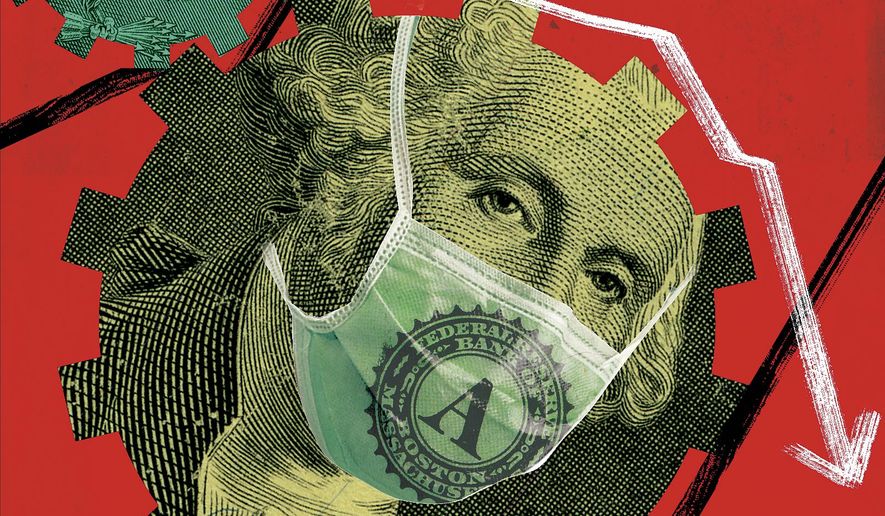OPINION:
It’s tax season again and Caesar wants his cut.
The national debt is approaching $30 trillion, and Congress wants to add 2 more trillion for more “COVID-19 relief.”
The current bill being pushed by Nancy Pelosi and Chuck Schumer is composed of massive pork barrel spending and a bail-out for high-tax Democratic states that have mismanaged their finances. Oh, and some more money for COVID-related economic distress on the heels of the earlier $4 trillion, of which $1 trillion has yet to be released.
Even if this monstrosity of a bill is somehow shaved down, it’s only a matter of time before our already-high taxes go through the roof.
Facing a choice between cutting spending and raising taxes, Caesar’s appetite for more “revenue” will become unstoppable. The Trump tax cuts, which benefited the vast majority of taxpayers, despite the left’s false claim that they helped only “the rich,” will seem like a golden age.
Unlike the citizens of ancient Rome, Americans live in a self-governing, constitutional republic in which we have no king; the people themselves are supposed to be “Caesar,” not serfs.
Nonetheless, “Caesar” is a timeless reference to government authority. While the Bible instructs citizens to obey the ruling authorities and to pay taxes, Jesus Himself sharply circumscribed what that means in an encounter with the Pharisees and Herodians.
The first group, the Pharisees, did not believe in paying taxes to the Romans; the second group, the Herodians (who were loyal to the Roman-appointed governor, Herod), believed that they should. So, if Jesus took either side, He would alienate large segments of the population, which was what the two groups hoped their trick question would accomplish.
They began by showering Jesus with fake respect. He was on to them, and delivered his famous answer.
Mark 12:14-17 recounts it this way: 13 Then they sent to Him some of the Pharisees and the Herodians, to catch Him in His words. 14 When they had come, they said to Him, “Teacher, we know that You are true, and care about no one; for You do not regard the person of men, but teach the way of God in truth. Is it lawful to pay taxes to Caesar, or not? 15 Shall we pay, or shall we not pay?”
But He, knowing their hypocrisy, said to them, “Why do you test Me? Bring Me a denarius that I may see it.” 16 So they brought it.
And He said to them, “Whose image and inscription is this?” They said to Him, “Caesar’s.”
17 And Jesus answered and said to them, “Render to Caesar the things that are Caesar’s, and to God the things that are God’s.”
And they marveled at Him.
In one stroke, Jesus rendered his would-be entrappers speechless, while sharply limiting the power of government. He made clear that Caesar only gets some of our money; our Creator, God, lays claim to everything else – our hearts, souls and time.
The Scriptures contain more than 2,300 verses referencing money, far more even than the topic of faith (600 verses). Jesus devoted more than 15% of his recorded words to this subject. He warned about “gaining the whole world and losing your soul” and surmised our motives, saying, “for where your treasure is, there your heart will be also.”
One way to think about taxes is to reflect that slavery is 100% taxation of someone’s labor. So, if government at all levels combined, including sales taxes, hidden taxes and fees, is taking half of our earnings, we could consider ourselves half slaves. Or half free.
The way to redress any perceived injustice in a self-governing republic is through the lawmaking process. We the People ultimately determine how much we pay in taxes by whom we choose to make our laws.
It’s something to keep in mind year-round instead of just around tax time. It’s a no brainer as to why politicians moved Election Day to November, as far away from Tax Day as they could.
Each year, the Tax Foundation calculates Tax Freedom Day, the theoretical day when, if we paid our year’s total tax bill up front, we get to keep what’s left. As government has grown, Tax Freedom Day has been pushed steadily back.
Before the 16th Amendment established the federal individual income tax in 1913, Americans paid about 6% of their income in taxes. Tax Freedom Day was Jan. 22 in 1906.
Fast forward to 2019, the last available Tax Freedom Day calculated, and the date is April 16. If we include future financing of the massive federal deficit, the date is pushed all the way to May 8. Can’t imagine what the trillions in COVID-19 spending will do to us in the near future.
The latest ever Tax Freedom Day, apart from during World War II, was May 1, 2000, when Americans paid a third — 33% — of our total income in taxes.
Bear in mind that the Bible recommends a tithe (10%) toward God’s work. The government, however, isn’t satisfied with that paltry amount. Like Edward G. Robinson’s “Johnny Rocco” in “Key Largo,” Caesar wants “More. Yeah, that’s right. I want more!”
Depending on how lavishly Caesar “invests” our taxes, we might be looking at a Tax Freedom Day someday on Halloween or even the Night Before Christmas.
• Robert Knight is a contributor to The Washington Times. His website is roberthknight.com.




Please read our comment policy before commenting.